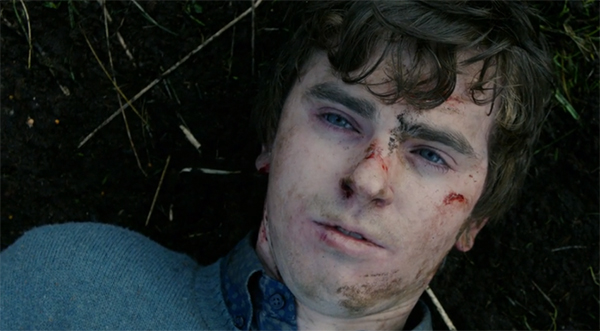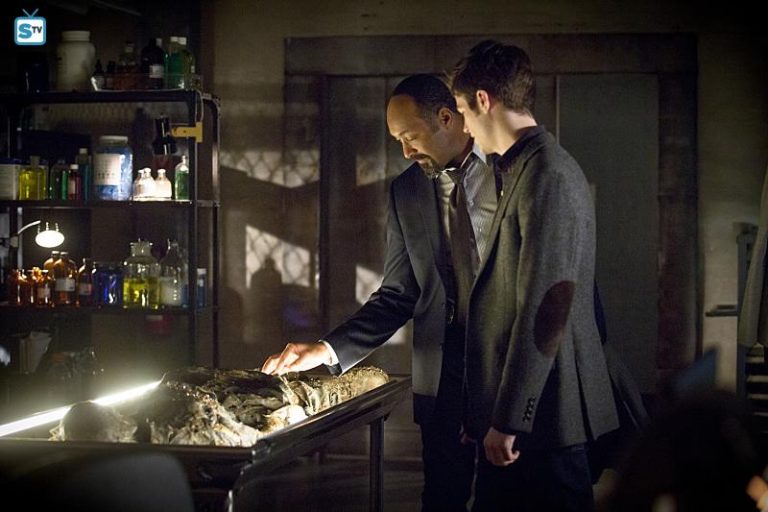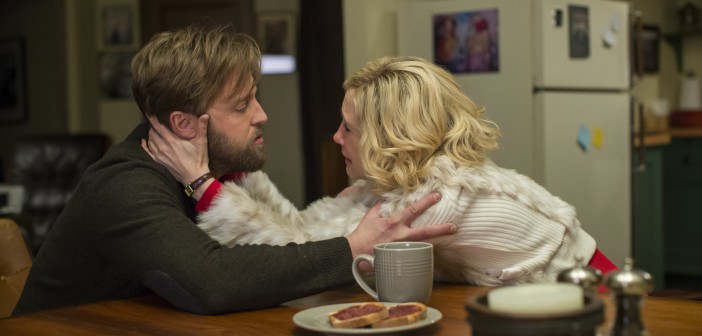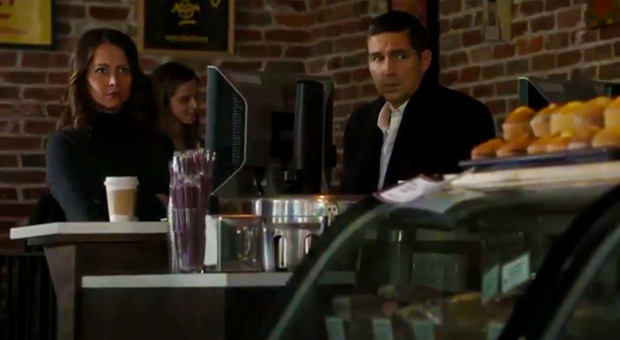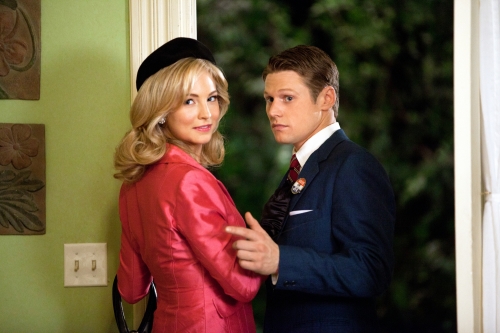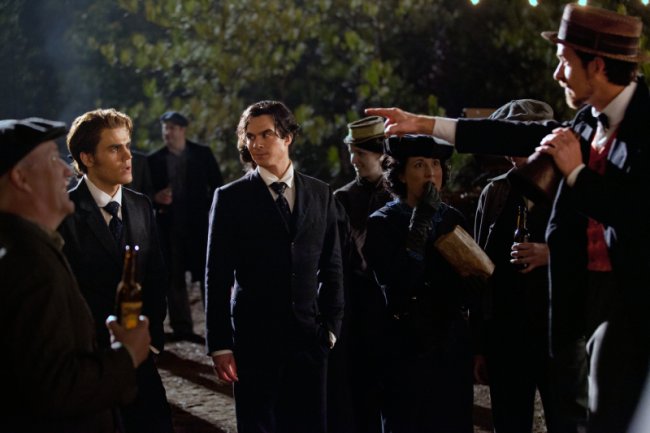 Bates Motel 3.7 (written by Philip Buiser) managed to pull off an impressive feat: It captured a snapshot of the sweet, tranquil family that could Have been – allowing the audience to revel in the wistfulness of that notion – while also shining a light on the dangerous, dysfunctional family that is, setting up an ominous picture of what is to come. In many ways, this episode was the antithesis of A Christmas Carol – an upside down and backwards “It’s a Wonderful Life” scenario. Norma got to see how her life could have turned out if only things were – different. Ultimately, it made for a most unusual and compelling hour.
Bates Motel 3.7 (written by Philip Buiser) managed to pull off an impressive feat: It captured a snapshot of the sweet, tranquil family that could Have been – allowing the audience to revel in the wistfulness of that notion – while also shining a light on the dangerous, dysfunctional family that is, setting up an ominous picture of what is to come. In many ways, this episode was the antithesis of A Christmas Carol – an upside down and backwards “It’s a Wonderful Life” scenario. Norma got to see how her life could have turned out if only things were – different. Ultimately, it made for a most unusual and compelling hour.
Norma just wants things to go back to “normal” after her little breakdown, but Norman is deeply affected by what he perceives as his mother’s abandonment. But Norma isn’t having any of it. She’s getting on with life, replacing the phone she shot up and chastising Norman as usual. When Norman continues to call his mother out on her behavior, she tells him, “Stop it Norman. “You’re acting like a twit. It’s not masculine and it’s not attractive.” As usual, this episode was filled with so many “Norma-isms” and the sharp, sardonic humor that is so seamlessly sprinkled within the show’s weighty subject matter. And Norman gives it right back to his mother when, trailing behind her as they leave the store, Norman says “Yes Mother. Here I come, following after you in a very masculine, attractive way.” The barbs these two throw at each other reflect the only normal part of their relationship. It’s during these sarcastic exchanges that Norman acts like a normal, resentful teenager and Norma plays the part of the tough, exasperated mom.
After their difficult night with Norman, Dylan and Emma have bonded. Dylan wants to take Emma to dinner to thank her for her support of his family, but we all know that behind that gesture, Dylan sees a kindred soul. He and Emma are both lonely, looking to be loved, and longing to be a part of the Bates family. These two understand each other. They discovered that while sitting on a bathroom floor, in between blackouts, coughing fits, and everything else the chaotic evening brought. There’s no turning back for them now. And with Norman’s preoccupation with his mother, will he really care or even notice?
Unfortunately, just as Dylan and Emma have found each other, Emma’s health seems to be deteriorating. Emma’s father comes into the picture (out of nowhere) to confirm it. He wants his daughter to take it easy and preserve her life, while Emma wants to explore her potential with Dylan and live her life. Later, Dylan learns from Emma’s dad that Emma can get to the top of a lung transplant list with the right monetary donation. And as fate would have it, Chick comes out of the woodwork – which is the only thing he seems to have done all season – looking for someone to transport his guns. Hearing this, Dylan immediately jumps at the opportunity to make some fast cash for Emma. Dylan’s earnestness in wanting to help Emma is sweet, but he should know by now that forays into illegal activities never end well.
Meanwhile Romero leaves a little present on Bob Paris’ street. Paris’ reaction was priceless as he gazed into the car that held Marcus Young’s bloody corpse, complete with formal note of withdrawal for county sheriff pinned to the dead man’s chest (Does everyone in this town have the same razor sharp sense of humor as Norma?). You can always count on Romero to play hardball.
When Norma returns home, Romero is waiting at her house. She wonders how he got shot, he wonders where the hell she’s been. His repeated questioning and statement that he thought she was dead irritates Norma, making her launch into another Norma-ism with “Why does everyone immediately jump to I died?” Romero wants the flash drive, because things have gotten far too dangerous with Paris. Norma acquiesces and tells him where it’s at, but when the sheriff goes to the farm and has Gunner open the contents of the flash drive, he sees his dead mom’s name on the ledger.
Viewers have slowly learned more about Romero this year, and when he visits his crooked cop dad in jail, the writers reveal another reason for Romero’s many built up walls: His mother killed herself, and Romero blames his father, telling him “You drove her to it.” Through the pair’s intense and hostile exchange, we see Romero’s deep-seated resentment of his dad’s corrupt behavior. But it brings up an interesting point: Did Romero follow in his father’s footsteps in White Pine Bay? The elder Romero gleefully tells his son he’s a chip off the old block, but Romero swears he’s nothing like his dad. The truth probably lies somewhere in between, but regardless, I’m really enjoying seeing more layers of Romero peeled away.
This season, Dylan has been through an emotional ringer, first with Caleb, then with his mom and the flash drive, and now with his little brother. He finally makes the decision that it’s time to talk to Norma about Norman. In true Norma fashion, she tries to hand wave Dylan’s concerns away, but it’s hard to remain in denial when you hear that your troubled son has been walking around the kitchen in your robe and channeling your very essence. “He thinks he’s you, Norma,” Dylan tells her. At long last, it seems to finally dawn on Norma that her youngest needs professional help.
But Norma’s version of help involves springing her one night stand James Finnigan on an unsuspecting Norman. When Finnigan starts asking questions, Norman immediately becomes defensive. He doesn’t want to talk about himself, but instead starts interrogating Finnigan about his sexual escapades with Norma -much like a jealous lover. James then finally asks the question that has been bubbling underneath Norman’s own subconscious for three seasons. “Norman, do you want to sleep with her?” Being faced with a concept that is simultaneously repulsive yet vaguely appealing to Norman pushes him to attack Finnigan, and he begins to strangle the therapist right there on the basement steps. Finnigan escapes, but as he runs out the door for his life, he pleads with Norma to get her son some real help.
Yet, when Norma goes to the basement, she doesn’t witness the violent, unhinged man that Finnigan just encountered. Instead, she sees her vulnerable son, crying and wounded from his mother’s rejection of him. This is the side of Norman that Norma knows how to deal with. This is the young boy that just needs to be held tightly and smothered in love. So Norman decides a nice quiet dinner will set things right.
But first, she has to pick up a drunk Romero, who drowned his frustrations and sadness over his family’s past with lots of alcohol. After Norma tucks the sheriff into bed, he drops those walls and confides his familial secrets to her. And to Norma’s credit she doesn’t judge him, but just softly empathizes with a quiet “Life is so hard, isn’t it?’ Romero makes his move, but Norma seems to know this isn’t the right time. At some point, though, they really do have to get together. After all, the writers take every opportunity to give us these little moments between the two, and Vera Farmiga and Nestor Carbonell have such a great chemistry together, it’s hard not to buy into “Normero.”

For all her faults, Norma does seem to have compassion for the men in her life, and Caleb is the next beneficiary when he happens upon Norma as he’s lurking around his sister’s house with flowers and a thank you note. Quite unexpectedly for Caleb, Norma invites him to dinner for just one night of family togetherness. It’s hard not to pity Caleb, and Kenny Johnson infuses the character with so much vulnerability and guilt-stained emotion that he’s become something of an underdog – I can’t help but root for him to turn his life around.
So as the Bates house fills for dinner, those in attendance all get something surprising: Norma gets her fantasy of an inviting, warm home where loved ones gather; Dylan gets a family moment with both his mom and dad together; Caleb gets more forgiveness and acceptance; And for Emma and Romero, they get to finally belong somewhere. And amidst toasts, food, and laughter, this patchwork family is content and happy.
All except for one member that is: For Norman, the night is anything but happy. He has to share his mother with those who are at best related only by blood, and at worst, insidious outsiders. He’s able to restrain himself at dinner, but when everyone is gone and the comfort of the dark night sets in, Norman sneaks into his mother’s room and finally gets his special moment, running his hands over Norma’s still body -claiming her as his own. It’s creepy and very disturbing. And it’s a sign Norman is becoming more brazen as he descends deeper into madness.
Season three has allowed all its players to be intertwined more significantly than in earlier years, with “The Last Supper” epitomizing that new dynamic. The result is relevant storylines that flow together seamlessly and continue to be compelling. And as these characters become more involved in each other’s lives, the stakes get higher. Norman’s unraveling mind will have far reaching and devastating consequences for everyone involved. And as tragic as that will be, it will also be fascinating to watch unfold.

